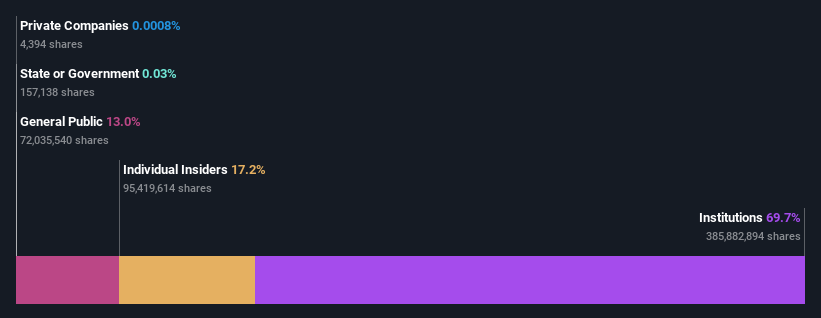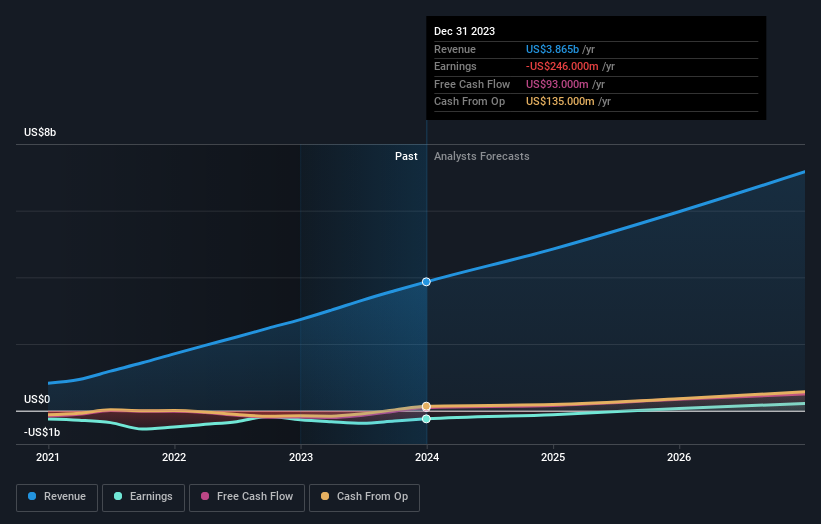- United States
- /
- Diversified Financial
- /
- NYSE:TOST
Toast, Inc. (NYSE:TOST) is favoured by institutional owners who hold 70% of the company

Key Insights
- Institutions' substantial holdings in Toast implies that they have significant influence over the company's share price
- The top 13 shareholders own 52% of the company
- Insiders have sold recently
Every investor in Toast, Inc. (NYSE:TOST) should be aware of the most powerful shareholder groups. The group holding the most number of shares in the company, around 70% to be precise, is institutions. That is, the group stands to benefit the most if the stock rises (or lose the most if there is a downturn).
Since institutional have access to huge amounts of capital, their market moves tend to receive a lot of scrutiny by retail or individual investors. Therefore, a good portion of institutional money invested in the company is usually a huge vote of confidence on its future.
Let's take a closer look to see what the different types of shareholders can tell us about Toast.
Check out our latest analysis for Toast

What Does The Institutional Ownership Tell Us About Toast?
Many institutions measure their performance against an index that approximates the local market. So they usually pay more attention to companies that are included in major indices.
We can see that Toast does have institutional investors; and they hold a good portion of the company's stock. This can indicate that the company has a certain degree of credibility in the investment community. However, it is best to be wary of relying on the supposed validation that comes with institutional investors. They too, get it wrong sometimes. When multiple institutions own a stock, there's always a risk that they are in a 'crowded trade'. When such a trade goes wrong, multiple parties may compete to sell stock fast. This risk is higher in a company without a history of growth. You can see Toast's historic earnings and revenue below, but keep in mind there's always more to the story.

Investors should note that institutions actually own more than half the company, so they can collectively wield significant power. Toast is not owned by hedge funds. The company's largest shareholder is The Vanguard Group, Inc., with ownership of 6.6%. In comparison, the second and third largest shareholders hold about 6.2% and 5.7% of the stock. Interestingly, the bottom two of the top three shareholders also hold the title of Top Key Executive and Member of the Board of Directors, respectively, suggesting that these insiders have a personal stake in the company. Furthermore, CEO Aman Narang is the owner of 3.6% of the company's shares.
A closer look at our ownership figures suggests that the top 13 shareholders have a combined ownership of 52% implying that no single shareholder has a majority.
While it makes sense to study institutional ownership data for a company, it also makes sense to study analyst sentiments to know which way the wind is blowing. Quite a few analysts cover the stock, so you could look into forecast growth quite easily.
Insider Ownership Of Toast
The definition of company insiders can be subjective and does vary between jurisdictions. Our data reflects individual insiders, capturing board members at the very least. The company management answer to the board and the latter should represent the interests of shareholders. Notably, sometimes top-level managers are on the board themselves.
Most consider insider ownership a positive because it can indicate the board is well aligned with other shareholders. However, on some occasions too much power is concentrated within this group.
Our most recent data indicates that insiders own a reasonable proportion of Toast, Inc.. It is very interesting to see that insiders have a meaningful US$2.3b stake in this US$13b business. Most would say this shows a good degree of alignment with shareholders, especially in a company of this size. You can click here to see if those insiders have been buying or selling.
General Public Ownership
With a 13% ownership, the general public, mostly comprising of individual investors, have some degree of sway over Toast. This size of ownership, while considerable, may not be enough to change company policy if the decision is not in sync with other large shareholders.
Next Steps:
It's always worth thinking about the different groups who own shares in a company. But to understand Toast better, we need to consider many other factors. Consider risks, for instance. Every company has them, and we've spotted 1 warning sign for Toast you should know about.
If you would prefer discover what analysts are predicting in terms of future growth, do not miss this free report on analyst forecasts.
NB: Figures in this article are calculated using data from the last twelve months, which refer to the 12-month period ending on the last date of the month the financial statement is dated. This may not be consistent with full year annual report figures.
Valuation is complex, but we're here to simplify it.
Discover if Toast might be undervalued or overvalued with our detailed analysis, featuring fair value estimates, potential risks, dividends, insider trades, and its financial condition.
Access Free AnalysisHave feedback on this article? Concerned about the content? Get in touch with us directly. Alternatively, email editorial-team (at) simplywallst.com.
This article by Simply Wall St is general in nature. We provide commentary based on historical data and analyst forecasts only using an unbiased methodology and our articles are not intended to be financial advice. It does not constitute a recommendation to buy or sell any stock, and does not take account of your objectives, or your financial situation. We aim to bring you long-term focused analysis driven by fundamental data. Note that our analysis may not factor in the latest price-sensitive company announcements or qualitative material. Simply Wall St has no position in any stocks mentioned.
About NYSE:TOST
Toast
Operates a cloud-based digital technology platform for the restaurant industry in the United States, Ireland, India, and internationally.
Flawless balance sheet with high growth potential.
Similar Companies
Market Insights
Community Narratives



